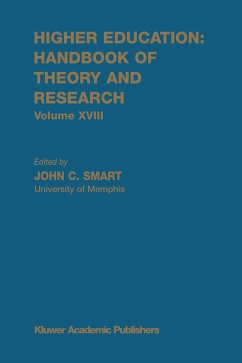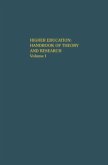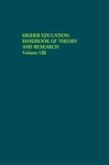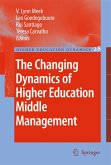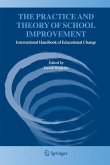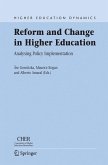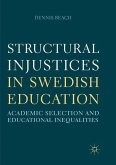Produktdetails
- Verlag: Springer / Springer Netherlands
- Artikelnr. des Verlages: 978-1-4020-1231-0
- 2003
- Seitenzahl: 748
- Erscheinungstermin: 30. September 2003
- Englisch
- Abmessung: 241mm x 160mm x 45mm
- Gewicht: 1216g
- ISBN-13: 9781402012310
- ISBN-10: 1402012314
- Artikelnr.: 22085904
- Herstellerkennzeichnung
- Springer-Verlag GmbH
- Tiergartenstr. 17
- 69121 Heidelberg
- ProductSafety@springernature.com
"Each contribution, (solid studies of literature) are written by native professional researchers, who are famous in their field [...] The consequence is that the contributions in the handbook are based on similar research, this presents us with a wide perspective course of action, which can be touched on for future research. It is evident that each research group who is involved in Higher Education should have a subscription for this book."
(Hans van Hout, University of Amsterdam)
"There are several reasons why the Handbooks deserve a wider audience, especially among scholars, policy-makers and practitioners in the United Kingdom. Firstly the shift to mass higher education in England and the other home countries, although two decades behind the American expansion, has brought shared problems and common worries, notably in relation to access, funding and quality. [...] A second reason, then, for bringing the Handbooks to a wider audience would be to force consideration of the need for (and value of) a parallel series: one focused mainly but not exclusively on the British or, more ambitiously, the European context. [...] The strength of the series (for the outsider at least) is its Americanism. For overseas students and scholars, the Handbooks provide a ready guide to the shifting contours of American higher education and the approaches to research within that system. Alongside synoptic studies in the mainline American journals of higher education, where Handbook chapters are frequently cited, the volumes should be a first port of call for the overseas researcher and the scholar-administrator. Moreover, since 1988, the Handbooks have offered readers an appreciation of the public service and career dimensions of American higher education, by way of an opening chapter in which senior figures volunteer personal and professional reflections on a life in and around the academy."
(Gareth Parry, School of Education, University of Sheffield. (Journal Teaching in Higher Education)
(Hans van Hout, University of Amsterdam)
"There are several reasons why the Handbooks deserve a wider audience, especially among scholars, policy-makers and practitioners in the United Kingdom. Firstly the shift to mass higher education in England and the other home countries, although two decades behind the American expansion, has brought shared problems and common worries, notably in relation to access, funding and quality. [...] A second reason, then, for bringing the Handbooks to a wider audience would be to force consideration of the need for (and value of) a parallel series: one focused mainly but not exclusively on the British or, more ambitiously, the European context. [...] The strength of the series (for the outsider at least) is its Americanism. For overseas students and scholars, the Handbooks provide a ready guide to the shifting contours of American higher education and the approaches to research within that system. Alongside synoptic studies in the mainline American journals of higher education, where Handbook chapters are frequently cited, the volumes should be a first port of call for the overseas researcher and the scholar-administrator. Moreover, since 1988, the Handbooks have offered readers an appreciation of the public service and career dimensions of American higher education, by way of an opening chapter in which senior figures volunteer personal and professional reflections on a life in and around the academy."
(Gareth Parry, School of Education, University of Sheffield. (Journal Teaching in Higher Education)

